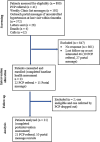Self-Monitoring With Coping Skills and Lifestyle Education for Hypertension Control in Primary Care
- PMID: 39437225
- PMCID: PMC11654848
- DOI: 10.1111/jch.14921
Self-Monitoring With Coping Skills and Lifestyle Education for Hypertension Control in Primary Care
Abstract
Self-monitoring with support, lifestyle modifications, and emotion management improves blood pressure (BP). Patients with hypertension need continual support to modify behaviors, but time pressures limit lifestyle education in primary care settings. Using mixed methods, we aimed to study the feasibility and acceptability of an innovative 6-week program that combined self-monitoring with coping skills and lifestyle education for patients with uncontrolled hypertension. Patients with uncontrolled hypertension interested in lifestyle modifications before intensifying medications were enrolled from primary care clinics. Patients self-monitored emotions, behaviors, and BPs and received education from medical providers and mind-body therapists through shared medical appointments (SMAs) with an option of weekly printed materials. Over 6 months, 31 eligible participants completed the program with higher uptake (21/41) from physician referrals (74.2% women, 41.9% Black, median household income $100 000). Fourteen participants opted for weekly educational materials due to upcoming SMA sessions being fully booked or personal schedules. Pre- to post-intervention paired t-test showed improvement in systolic BP of 11.6 mmHg (95% CI, 6.6-16.6, p < 0.0001), and hypertension control rate improved by 36% (11/31) post-intervention. Higher baseline systolic BP was associated with higher BP reduction (p < 0.001). Thematic analysis showed the perceived benefit of self-awareness, education, and peer support, whereas time constraints were perceived as challenges. Self-monitoring with education on coping skills and lifestyle modification is feasible and improved BP and hypertension control across diverse primary care patients interested in lifestyle modifications; however, few low-income patients enrolled. Less burdensome and community-based interventions may improve participation in low-income patients.
Keywords: coping skills; ecological momentary assessments; hypertension; lifestyle; patient education; self‐monitoring.
© 2024 The Author(s). The Journal of Clinical Hypertension published by Wiley Periodicals LLC.
Conflict of interest statement
The authors declare no conflicts of interest.
Figures
References
-
- Muntner P. and Hardy S. T., “Together, We've Got This: The US Surgeon General's Call‐to‐Action on Hypertension Control,” American Journal of Hypertension 34, no. 9 (2021): 893–894. - PubMed
-
- Egan B. M., Li J., Sutherland S. E., Rakotz M. K., and Wozniak G. D., “Hypertension Control in the United States 2009 to 2018: Factors Underlying Falling Control Rates During 2015 to 2018 Across Age‐ and Race‐Ethnicity Groups,” Hypertension 78, no. 3 (2021): 578–587. - PubMed
-
- Suls J., Mogavero J. N., Falzon L., Pescatello L. S., Hennessy E. A., and Davidson K. W., “Health Behaviour Change in Cardiovascular Disease Prevention and Management: Meta‐Review of Behaviour Change Techniques to Affect Self‐Regulation,” Health Psychology Review 14, no. 1 (2020): 43–65. - PMC - PubMed
MeSH terms
Grants and funding
LinkOut - more resources
Full Text Sources
Medical


